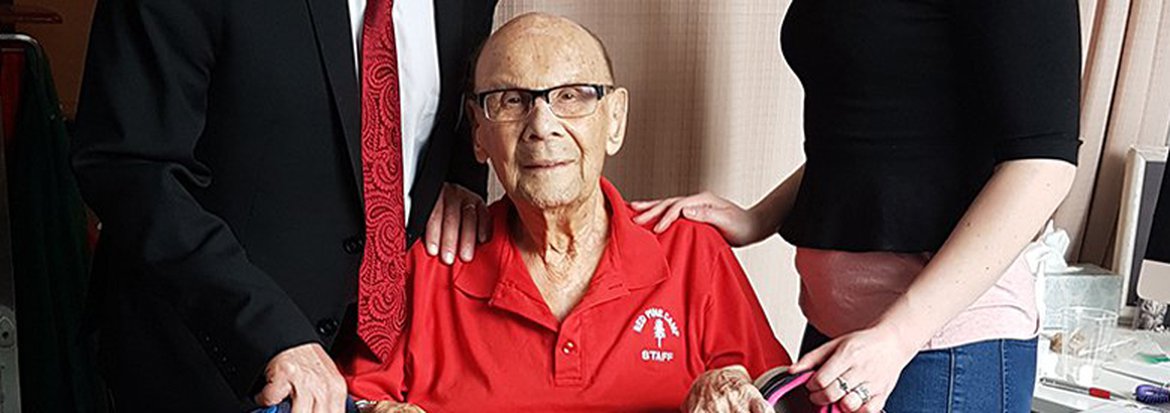Once a Runner, Always a Runner

Check out Lorne's strory in the
Foundation Honour and Care newsletter
Whenever Ottawa Race Weekend approaches, Lorne Hooper misses the running he enjoyed for most of his life. As a youth, he competed in track and field, and doesn’t remember ever losing a 100-yard dash. As an adult, he ran longer distances to stay fit, and to manage the stress of work and family life. Ten years ago, after recovering from surgery to implant a pacemaker, he ran his last road race – the Terry Fox Run – at the age of 85.
“Whenever I see someone running now, it tugs at my heart strings,” he says with a smile. “I can accept that my running days are over, but it would be nice to get out there again.”
Born in Ottawa in 1922, Lorne lived in New York City for a few years as a baby; his father, a plasterer, found work there until the Depression. The family moved back to the Glebe, and Lorne went to Ottawa Technical High School and served in the Non-Permanent Active Militia – he was a so-called Saturday-night soldier. At the age of 15, his father died and his mother took a job as a nurse.
When the Second World War broke out, Lorne enlisted; when the Forces learned he was underage, he served in various administrative roles. He longed to be a pilot and transferred to the Royal Canadian Air Force as soon as he was old enough, but by 1943, the demand for pilots had evaporated. He took solace in meeting the love of his life: Yvonne Cavanagh, who worked for the United Kingdom’s inspection board. They soon married and went on to spend the next 75 years together.
The Commonwealth Air Training Plan soon provided Lorne the opportunity to pursue his dreams and he shipped out to a training centre known as “Little Norway.” Operated by the Norwegian Army Air Service, the facility was on the site of today’s Toronto Island Airport.
After also training in Guelph and Calgary, Lorne became a WAG: a wireless operator/air gunner. He was eventually posted to RCAF Station Charlottetown, and hunted for Nazi submarines on board a Bristol Bolingbroke. “We did our best, but never found any, unfortunately,” he says.
During the war, Lorne volunteered to participate in a clinical trial conducted by the National Research Council. Scientists applied chemicals to small patches of skin along one of his arms, then exposed the areas to poison gas. “It wasn’t much of a bother at the time,” Lorne recalls. “And in 2003, I received more than $20,000 in compensation, so I used it to pay off a few debts.”
Lorne continued his public service after the war in a variety of administrative roles. He reenlisted, served in both the army and navy, and eventually rose to the rank of sergeant. He and Yvonne built a home in the new Ottawa neighbourhood of Alta Vista, where they raised their daughter Linda. Before Linda started high school, Yvonne took a full-time job as a school secretary.
Each summer, the family vacationed at Red Pine Camp; Yvonne and Lorne both served in various volunteer positions there. Lorne continued his career with the Department of National Defence (DND), specializing in the management of real property. At the time, DND owned more than 10,000 buildings across the country and needed a way to manage these holdings.
During the 1970s, Lorne was instrumental in the development of a massive computer system known as CEMIS1 (Construction Engineering Management Information System #1). “We programmed one of the largest computers in Canada at the time,” says Lorne, “and we did it all with Fortran and punch cards. The mainframe was four storeys tall. Today, a watch has more memory and processing capacity than what we had.”
In the 1960s – long before jogging became a fad – Lorne got back into running both to stay in shape and to relieve stress. He ran in dozens of charity and community events. Lorne also served in the Masonic Lodge for more than 60 years, eventually becoming a Grand Lodge Officer.
Daughter Linda married John Fraser, currently a member of Ontario’s Legislative Assembly. Lorne and Yvonne were eventually blessed with three grandchildren and three great grandchildren. When Yvonne’s health began to fail, Lorne cared for her at home. Eventually, both moved in to Perley Health, where Yvonne passed away in her 98th year.
Nowadays, Lorne likes to spend time in the Perley Health’s crafts studio, making scarves; he also recently learned to play the ukulele. “The staff here are nice and there are plenty of ways for me to stay active,” he says. “And it was nice to meet members of Team Perley Health before this year’s Race Weekend.”

